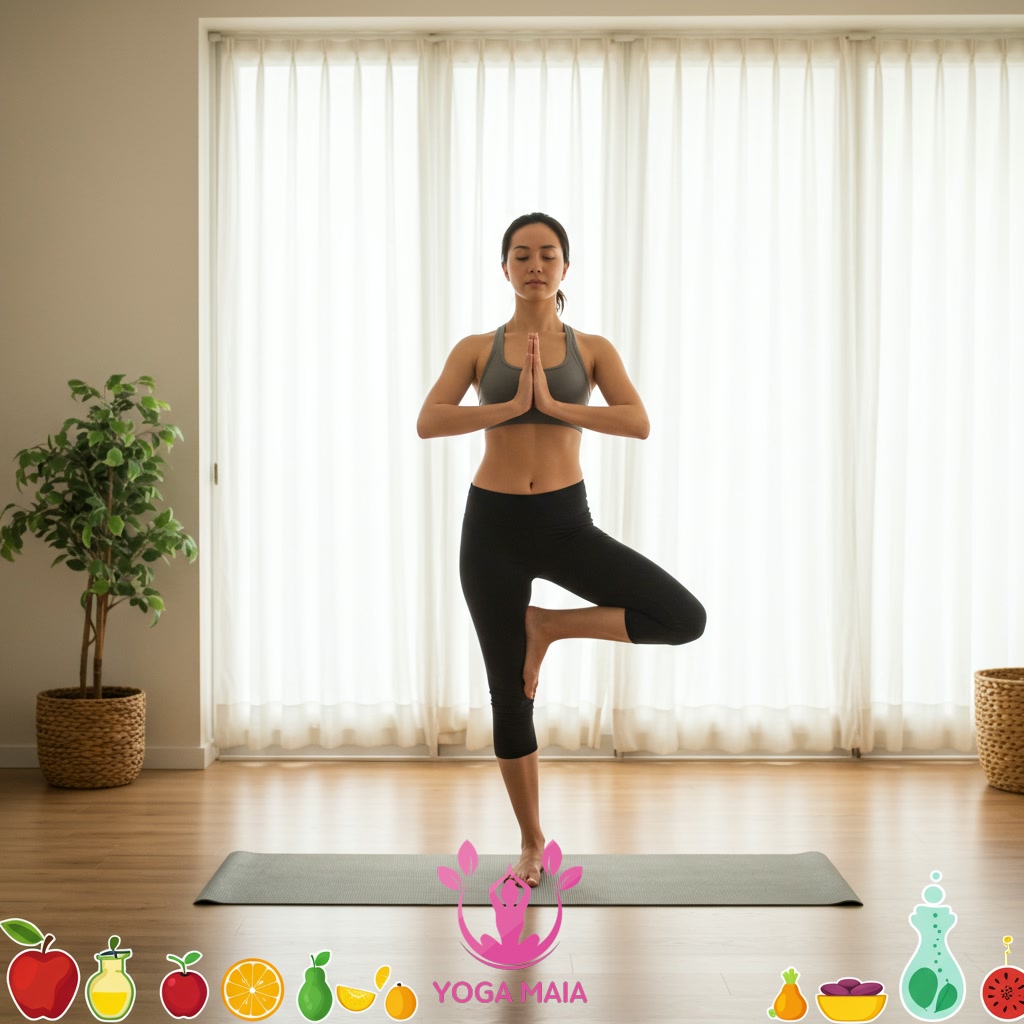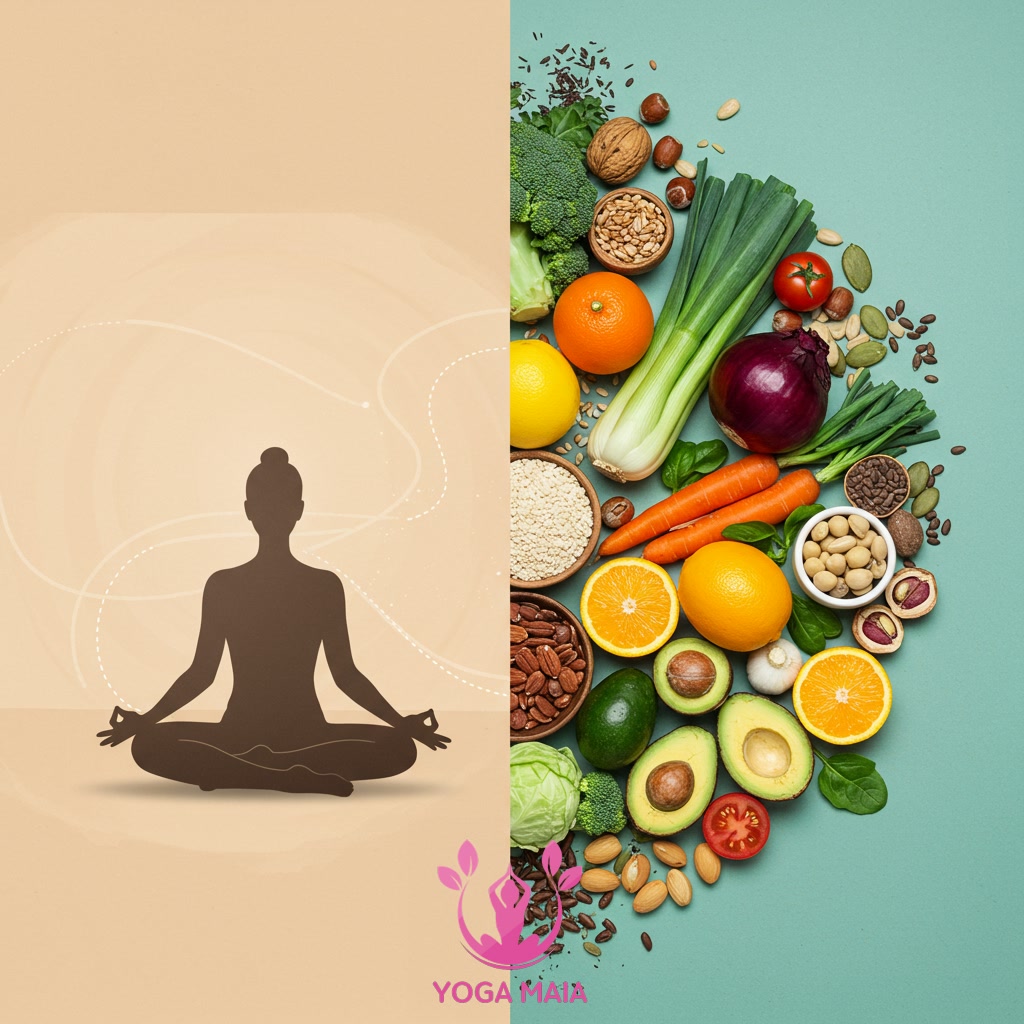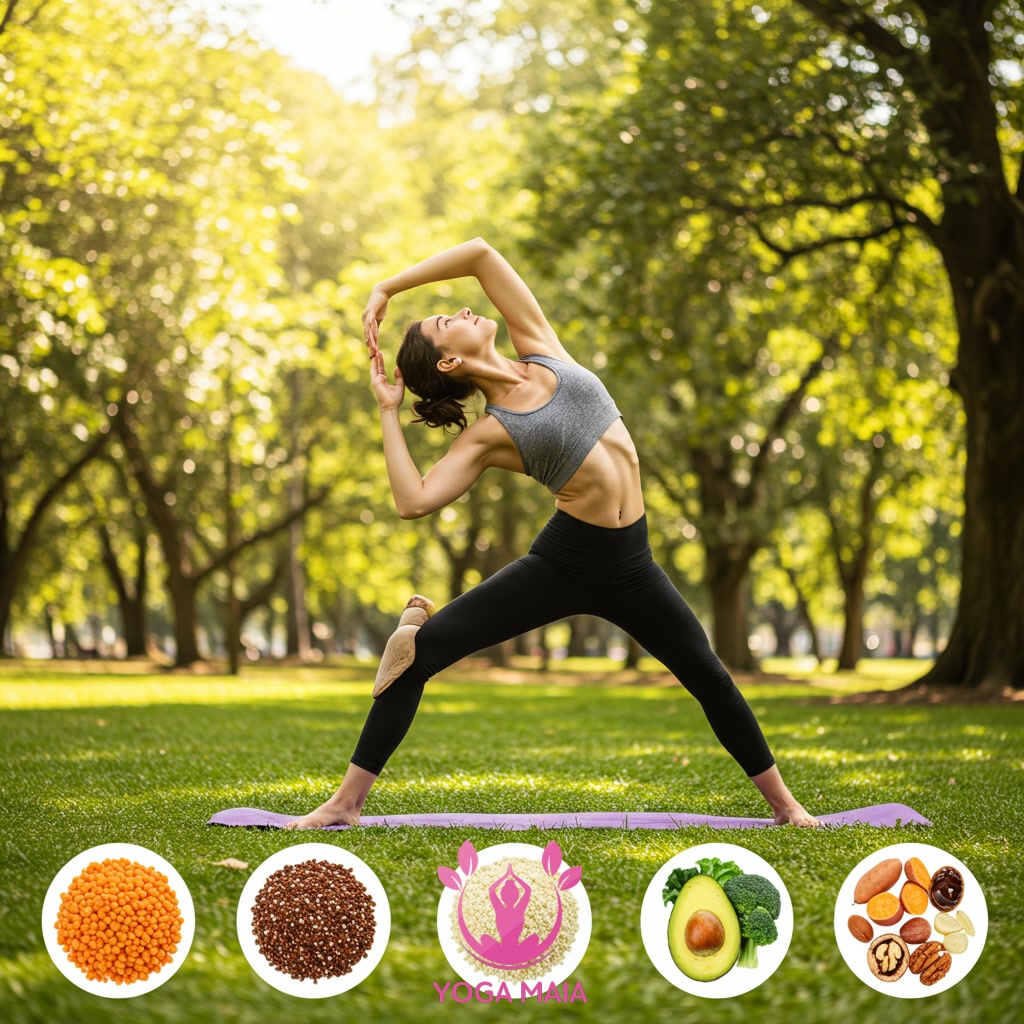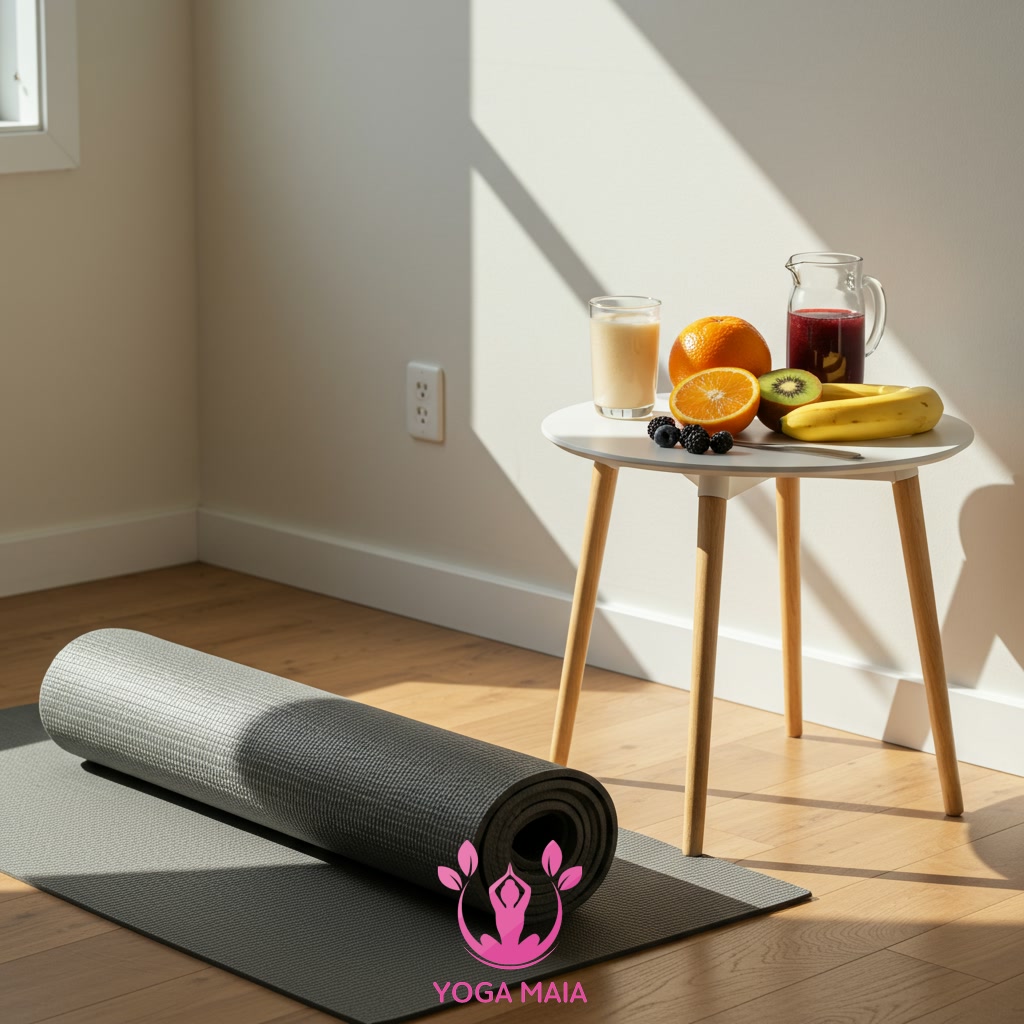Yoga Blog
Essential Vitamins and Nutrition for Enhanced Yoga Practice and Wellness

This document explores the crucial role of essential vitamins and proper nutrition in supporting yoga practice. It details how specific nutrients can enhance flexibility, energy levels, and recovery for individuals engaged in yoga. The content emphasizes the link between dietary choices and improved physical and mental wellness, complementing the benefits of yoga. Understanding and implementing these nutritional strategies can significantly elevate one’s overall yoga experience and well-being.
Table of Contents
- Section 1: Introduction: The Interplay of Nutrition and Yoga Practice
- Section 2: Essential Vitamins for Energy, Flexibility, and Recovery in Yoga
- Section 3: Key Minerals Supporting Bone Health, Muscle Function, and Focus for Yoga
- Section 4: Macronutrients: Fueling Your Yoga Practice (Proteins, Carbs, Fats)
- Section 5: Hydration: A Critical Component for Optimal Yoga Performance and Wellness
- Section 6: Integrating Nutrition into Your Yoga Lifestyle: Practical Tips and Meal Timing
- Section 7: Beyond the Mat: Achieving Holistic Wellness Through Diet and Yoga
Section 1: Introduction: The Interplay of Nutrition and Yoga Practice
Yoga is a holistic practice that extends beyond physical postures; it is a path towards integrated well-being. The effectiveness and benefits of this practice are significantly influenced by how we nourish our bodies. Nutrition provides the essential fuel, vitamins, and minerals required for enhancing flexibility, building strength, maintaining stamina, and facilitating recovery after yoga sessions. Proper hydration and a balanced intake of macronutrients directly impact energy levels, joint health, muscle function, and even mental clarity – all vital for a rewarding yoga experience. Recognizing and integrating the link between dietary choices and physical/mental readiness allows practitioners to optimize their performance on the mat and deepen the profound benefits yoga offers, creating a synergistic relationship that enhances overall health.
 Introduction: The Interplay of Nutrition and Yoga Practice
Introduction: The Interplay of Nutrition and Yoga Practice
Section 2: Essential Vitamins for Energy, Flexibility, and Recovery in Yoga
Building on the idea that our internal state significantly impacts our yoga journey, specific essential vitamins play a crucial role in optimizing performance and well-being on the mat. For instance, B vitamins are vital for converting food into usable energy, combating fatigue and supporting stamina during longer sessions. Vitamin D, often associated with bone health, also influences muscle function and mood, contributing to overall vitality. Vitamins like C and E act as antioxidants, aiding muscle recovery after challenging poses and reducing inflammation. Additionally, Vitamin C is essential for collagen synthesis, supporting joint health and potentially enhancing flexibility. Ensuring adequate intake of these key vitamins provides the foundational nutritional support needed to improve energy levels, deepen flexibility, and accelerate recovery, allowing for a more consistent and rewarding yoga practice.
 Essential Vitamins for Energy, Flexibility, and Recovery in Yoga
Essential Vitamins for Energy, Flexibility, and Recovery in Yoga
Section 3: Key Minerals Supporting Bone Health, Muscle Function, and Focus for Yoga
Continuing our exploration of essential nutrients, minerals are equally vital in complementing your yoga practice. Minerals like Calcium and Magnesium are foundational for strong bones, which are crucial for stability and support in weight-bearing yoga postures. Magnesium also plays a significant role in muscle function, helping with contraction and relaxation, thereby improving flexibility and preventing cramps during transitions and holds. Furthermore, minerals like Zinc and Magnesium are involved in nerve function and neurotransmitter production, contributing to improved focus and mental clarity, essential for maintaining presence and mindfulness on the mat. Ensuring adequate intake of these key minerals supports the physical structure, muscular control, and mental connection necessary for a deeper and more effective yoga journey.
 Key Minerals Supporting Bone Health, Muscle Function, and Focus for Yoga
Key Minerals Supporting Bone Health, Muscle Function, and Focus for Yoga
Section 4: Macronutrients: Fueling Your Yoga Practice (Proteins, Carbs, Fats)
Building on the foundational role of minerals, we now turn to macronutrients – the primary sources of energy and building blocks for your body, essential for fueling an effective yoga practice. Proteins are crucial for muscle repair and growth, helping your body recover from challenging poses and build strength. Complex carbohydrates provide the sustained energy needed to power through longer sessions and maintain focus. Healthy fats, often overlooked, are vital for nutrient absorption, hormone production, and supporting joint health, contributing to greater flexibility and comfort in poses. By consuming a balanced intake of these macronutrients, you ensure your body has the necessary resources to perform, recover, and gain the maximum physical benefits from your yoga journey, complementing the mental and spiritual aspects of the practice.
 Macronutrients: Fueling Your Yoga Practice (Proteins, Carbs, Fats)
Macronutrients: Fueling Your Yoga Practice (Proteins, Carbs, Fats)
Section 5: Hydration: A Critical Component for Optimal Yoga Performance and Wellness
Building on the foundational role of minerals and the energy provided by macronutrients, hydration emerges as an equally critical, yet often overlooked, component for optimizing your yoga practice and overall well-being. Water is essential for virtually every bodily function, playing a vital role in maintaining flexibility by keeping tissues and joints supple. Proper hydration prevents muscle cramps, supports detoxification processes, and helps regulate body temperature, which is particularly important during dynamic or heated yoga styles. Adequate fluid intake ensures efficient nutrient transport and waste removal, contributing to sustained energy levels throughout your session and aiding in faster recovery afterward. Dehydration, even mild, can significantly impair performance, leading to fatigue, reduced focus, and increased risk of injury. Making conscious efforts to stay well-hydrated before, during, and after yoga is fundamental to unlocking your body’s full potential on the mat and fostering a deeper sense of vitality.
 Hydration: A Critical Component for Optimal Yoga Performance and Wellness
Hydration: A Critical Component for Optimal Yoga Performance and Wellness
Section 6: Integrating Nutrition into Your Yoga Lifestyle: Practical Tips and Meal Timing
Building on the foundational role of minerals and the energy provided by macronutrients, hydration emerges as an equally critical, yet often overlooked, component for optimizing your yoga practice and overall wellness. Integrating sound nutrition into your yoga lifestyle requires practical strategies and mindful meal timing. For instance, consuming light, easily digestible foods like fruit or a small smoothie about 1-2 hours before practice provides sustained energy without discomfort. Avoid heavy meals immediately before, as they can impede movement and breathwork. Post-yoga, focus on replenishing nutrients with a balanced meal or snack containing protein and carbohydrates to aid muscle recovery and restore energy levels. Consistency is key; planning meals and snacks ensures you meet your nutritional needs regularly, supporting enhanced flexibility, energy, and a deeper connection with your body during your yoga journey.
 Integrating Nutrition into Your Yoga Lifestyle: Practical Tips and Meal Timing
Integrating Nutrition into Your Yoga Lifestyle: Practical Tips and Meal Timing
Section 7: Beyond the Mat: Achieving Holistic Wellness Through Diet and Yoga
Building on the foundational role of minerals, macronutrients, and essential hydration, achieving true holistic wellness extends far beyond the physical movements on the yoga mat. This deeper connection is forged through conscious dietary choices that nourish the body from within, complementing the flexibility, strength, and mental clarity gained through practice. Consuming nutrient-dense foods provides the sustained energy needed for challenging poses and aids in quicker muscle recovery. Furthermore, a balanced diet supports hormonal balance and brain function, enhancing the meditative and stress-reducing aspects of yoga. Integrating mindful eating with a consistent yoga routine creates a powerful synergy, fostering not just physical health, but also emotional resilience and spiritual well-being, truly embodying wellness in its most comprehensive form.
 Beyond the Mat: Achieving Holistic Wellness Through Diet and Yoga
Beyond the Mat: Achieving Holistic Wellness Through Diet and Yoga












